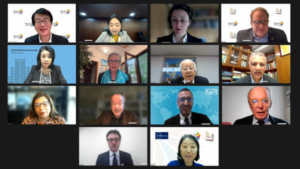How can constructive cooperation succeed in a multipolar world and in the context of an intensifying systemic competition between democracy and autocracy? How can we (jointly) overcome the challenges of the „Zeitenwende“?
Prof. Anna-Katharina Hornidge addressed these key questions in a so-called fireside chat with Federal President Steinmeier and Finnish President Sauli Niinistö on 15 November 2023 in Bonn. Together with other international experts, Anna-Katharina Hornidge reflected on why cooperation is important despite and, at the same time, especially against the background of geopolitical challenges – both for jointly tackling global problems and for ensuring Germany’s and Europe’s (integrated) security.

Based on IDOS’ involvement in this year’s T7 process, which brought together international think tanks to jointly develop policy recommendations along the thematic priorities of the Japanese G7 presidency, Anna-Katharina Hornidge also participated in a virtual event on 16 November to hand over the Japanese T7 presidency to the Italian institutes ISPI (Italian Institute for International Political Studies) and IAI (Istituto Affari Internazionali). Italy will take over the presidency of the G7 in January 2024. As Anna-Katharina Hornidge emphasised in her keynote, the G7 and T7 must also contribute to shaping multilateral and regional science systems under future presidencies. She reported that IDOS continues the discussions held during the Japanese T7 process on improving established funding modalities with the German UNESCO Commission.
Dr Axel Berger, who co-led a working group on macroeconomics, trade and livelihoods in this year’s T20 process, took part in the Cape Town Conversations in Cape Town from 24 – 26 November. In the context of four consecutive Southern Presidencies of the G20 (Indonesia 2022, India 2023, Brazil 2024 and South Africa 2025) and the inclusion of the African Union in the G20, the Cape Town Conversations brought together high-level international speakers and participants from politics, academia, the private sector and civil society to reflect on current global challenges (especially from the perspective of the Global South) in various formats.
While the G7 and G20 are important forums for tackling current global challenges, issues relating to international cooperation in a multipolar world also play a role in shaping German foreign policy. Germany’s National Security Strategy recognises a multipolar world order in which Germany’s security cannot be conceived and guaranteed in isolation from other regions of the world. However, the strategy hardy addresses how reciprocal partnerships with countries from different regions and income groups can be expanded and lead to a strengthening of German security. Against this backdrop, the Bonn Symposium 2023 on 23 November, organised by the Development and Peace Foundation (sef), the Institute for Development and Peace (INEF) and the Institute for Peace Research and Security Policy (IFSH) at the University of Hamburg, addressed the question of how countries beyond the major global players view the strategy and how Germany can and should shape its relations with them in a partnership-based and sustainable way. In an introductory presentation, Anna-Katharina Hornidge reflected on the current political, economic and ecological processes that determine the context in which the National Security Strategy is to be implemented. She emphasised that Germany’s security can only be guaranteed if it thinks beyond German and European borders and strengthens international partnerships that enable constructive cooperation in a multipolar world.

Schreibe einen Kommentar